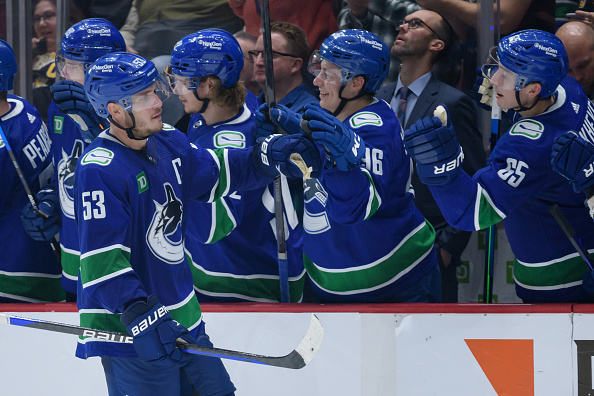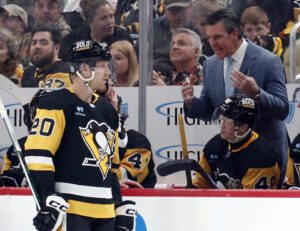The Vancouver Canucks options post-2021-22 seemed simple. Extend Boudreau, trade J.T. Miller, sign Bo Horvat, get a right-handed defenceman, and either sign or trade Brock Boeser. Exactly one of those things happened. An off-season filled with intrigue and not much else made for a risky 2022-23 season and fair to say the gamble didn’t pay off.
Vancouver Canucks Options Aren’t Actions
Over-reacting in a big way after 10% of the season has been played sounds ridiculous, and it is. What’s happening in Vancouver now isn’t after eight games, though – it’s after eight years. It’s easy to say when a rebuild should’ve started in hindsight, but hard to remember that the Canucks finished 2012-15 with 48 wins and 101 points. Getting bumped out of the first round was the warning flag, but you can see why it was ignored.
The shaky start to this season – especially after such an inspired run last year – can’t be ignored. And it isn’t, but what can be done about it is entirely different. In very broad terms, we’re talking about starting a massive rebuild, making smaller moves, or waiting it out. The Vancouver Canucks options are not all the same, and their repercussions can vary wildly. So what might they look like?
Burn, Baby, Burn!
Debate may occasionally rage over the band, but there are some who have ironic sympathy for the Canucks goal song.
@Canucks after teasing fans with Nickelback during preseason only to bring back LA LA LA LA.
Deserves to go winless.
— FamousGoalHorns 🚨 (@FamousGoalHorns) October 23, 2022
There is a distinct element in the Canucks Fans biosphere who hear the title “Burn it to the Ground” and nod in assent. What’s interesting is who is usually pointed to as examples of this style of “strip-it-down” rebuilding. Most frequently, you’ll hear the Edmonton Oilers and Buffalo Sabres brought up as recent examples, or the Chicago Blackhawks doing it currently. The Arizona Coyotes also come up as a team rebuilding, but it’s kind of hard to tell if it’s rebuilding or saving money inspiring their moves.
Arizona has fifteen picks in rounds two and three of the draft in the next three years. Chicago has two picks in rounds one, two and three for the next three drafts. Buffalo has six players 22 years old or younger playing major roles – and three second-round picks this year. And Edmonton, of course, has at least made it to the playoffs the last three years and hit 49 wins in 2021-22. So obviously those show how well the system works! Right?
The Counterpoint
The Oilers went to the Stanley Cup Final in 2006. Then they reached 40 wins twice in the next 13 years, making it to the playoffs once. So that’s an awfully long time to suck. Four first-overall picks and seven other top-ten picks, and they finally made it to the Conference Finals in 2021-22.
The Sabres are finally rounding the corner, but haven’t hit 40 wins in a year since 2010-11. There are a lot of draft hits on this team right now, but also a lot of fumbling in there. Twelve years in between playoff runs is hard to talk an owner into – and they might not make it this year, either. Sure, it wasn’t deliberate, but does that make it better or worse?
Chicago is just in chaos. That’s about as friendly a way to phrase it as possible. They’ve handed away skilled players – even the young ones – and let their veterans know they aren’t welcome. Unlike Buffalo, they have traded away every player they drafted first between 2013 to 2019. Like Vancouver, it was in an effort to remain in contention after making a Final run – though in Chicago’s case a successful one. They made the playoffs once since 2016-17, and that was as a “qualifier” while sitting last in their division.
As for Arizona, well who knows what the plan is there? Right now, it’s digging its way out of debt and getting through the next few years. The situation is unique enough that there isn’t really a lesson here for other teams.
Tiny Bubbles
We’ve harped on about the disastrous results from the 2020 offseason in Vancouver. For a team oh-so-slowly turning to a winning, optimistic future, the wind was completely taken out of their sails by letting the players who got them there walk* away as free agents. The players weren’t their most important, perhaps – outside of Jacob Markstrom – but they were part of the team. And they sure helped the Calgary Flames last season! Let’s, uh, just elide the changes forced on them during the offseason when they went all blockbuster-y, okay?
Not the biggest additions, but the right parts fit into the team the right way. Sure, the Vancouver Canucks options for big trades are few, but little ones are certainly possible. Or if looking to the Flames is too painful for Canucks fans, how about the New York Rangers? They kept a lot of their high picks and added the right mix of free agents and trades. And their famous “Letter to Fans” in 2018 bought them time to do a rebuild that they, uh, stopped almost immediately. Hm.
Counterpoint
They’re the New York Rangers and you’re not. Artemi Panarin decided he wanted to play there when he became a free agent, and that’s not someone a team should turn down. Adam Fox refused to sign with either the team that drafted him or the one he was traded to, waiting for the Rangers to sign him. Current captain Jacob Trouba limited the teams the Winnipeg Jets could trade him to – with the Rangers being one.
If top-of-the-line free agents and current players aren’t scrambling to join your club? Then any lessons from New York aren’t very applicable. It’s not like their first-round picks are driving the club, either. Alexis Lafreniere and Kappo Kakko, their two lottery wins, haven’t exactly lit the league on fire yet. Nor have Filip Chytil, Lias Andersson, Vitali Kravstov, Nils Lundqvist, or Braden Schneider. They can still, but those aren’t the players making the Rangers successful right now.
The Waiting Game
Here’s what we have, now deal with it. Salaries take time to move out or die off. The coach isn’t changing because they already have one on the payroll who isn’t working for them. Star players are not only hard to move but can come back to bite the team. Hard. So that leaves… doing nothing? Some minor changes, but holding off on major decisions for as long as possible to see if the team realizes how good it is. Or at least better than the record indicates. This is the option that frequently sparks outrage among the more vocal fans of a sports club. And to be fair, Canucks fans have been waiting an awfully long time for their team to “get good”.
The Colorado Avalanche is probably the best example of this style, with general manager Joe Sakic‘s astounding patience in moving a disgruntled star filling a lot of spaces in a growing team. It took almost a full calendar year to accomplish, despite the pressure of a weak team in a nightmare season. Post-trade, Colorado would struggle to hit the .500 mark before gelling and making the playoffs, getting beaten by one of the teams involved in the Matt Duchene trade. That’s the form of rebuild the Sabres ended up doing, but mostly because the only option left was waiting. Moving Jack Eichel helped the team fill out the picks they kept, even in hard times.
Counterpoint
There isn’t one, really. Few teams show a lot of patience in a rebuild, even the Detroit Red Wings who are sometimes held up as an example. Detroit has made a lot of moves, and their top scorers have mostly come from other teams. They were mostly under-the-radar deals, though, and show the value of having a strong pro scouting group. Plenty of rental signings and trades for draft picks and, again, patience. But there’s no hiding that it includes six seasons of sub-.500 hockey.
A slow build – or a failed “retool” – involves losing money for a long, long time. Or if not losing money, then not getting playoff revenue. If the Vancouver Canucks options include this, the fans need to support the team. And whether they will or not is a legitimate question.
Pick One, Pay Later
It’s not exactly nothing that Vancouver is doing, of course. The Canucks made two deals in two consecutive days on Thursday and Friday, shoring up weaknesses that they perhaps didn’t have the impetus to do before starting the season with a seven-game losing streak.
Vancouver hasn’t sold playoff tickets for seven years, and that’s starting to show up in the regular season, too. Fans are tired, but the hard fact is that it isn’t really their team. Horribly run franchises aren’t lacking in NHL history, no matter what the fans thought of them at the time. The team’s approach depends entirely on what the owner wants to do. There are arguments for any of the above approaches, and we’ve seen a couple of fairly minor deals recently.
Whether or not those are pressure-releasing valves or cracks in the dam we’re all going to find out together.
*swim, if we’re going to be consistent in our metaphor.
Main Photo:
Embed from Getty Images






